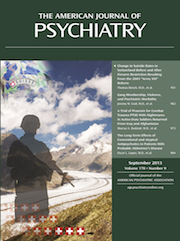A Trial of Prazosin for Combat Trauma PTSD With Nightmares in Active-Duty Soldiers Returned From Iraq and Afghanistan
Abstract
Objective
The authors conducted a 15-week randomized controlled trial of the alpha-1 adrenoreceptor antagonist prazosin for combat trauma nightmares, sleep quality, global function, and overall symptoms in active-duty soldiers with posttraumatic stress disorder (PTSD) returned from combat deployments to Iraq and Afghanistan.
Method
Sixty-seven soldiers were randomly assigned to treatment with prazosin or placebo for 15 weeks. Drug was titrated based on nightmare response over 6 weeks to a possible maximum dose of 5 mg midmorning and 20 mg at bedtime for men and 2 mg midmorning and 10 mg at bedtime for women. Mean achieved bedtime doses were 15.6 mg of prazosin (SD=6.0) and 18.8 mg of placebo (SD=3.3) for men and 7.0 mg of prazosin (SD=3.5) and 10.0 mg of placebo (SD=0.0) for women. Mean achieved midmorning doses were 4.0 mg of prazosin (SD=1.4) and 4.8 mg of placebo (SD=0.8) for men and 1.7 mg of prazosin (SD=0.5) and 2.0 mg of placebo (SD=0.0) mg for women. Primary outcome measures were the nightmare item of the Clinician-Administered PTSD Scale (CAPS), the Pittsburgh Sleep Quality Index, and the change item of the Clinical Global Impressions Scale anchored to functioning. Secondary outcome measures were the 17-item CAPS, the Hamilton Depression Rating Scale, the Patient Health Questionnaire–9, and the Quality of Life Index. Maintenance psychotropic medications and supportive psychotherapy were held constant.
Results
Prazosin was effective for trauma nightmares, sleep quality, global function, CAPS score, and the CAPS hyperarousal symptom cluster. Prazosin was well tolerated, and blood pressure changes did not differ between groups.
Conclusions
Prazosin is effective for combat-related PTSD with trauma nightmares in active-duty soldiers, and benefits are clinically meaningful. Substantial residual symptoms suggest that studies combining prazosin with effective psychotherapies might demonstrate further benefit.



